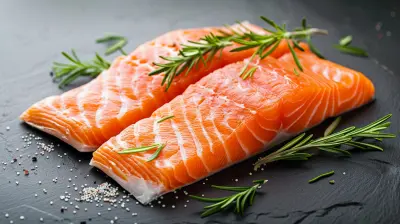Breaking Through a Weight Loss Plateau with Intermittent Fasting
31 May 2025
So... you've been doing all the "right" things — eating clean, working out, drinking water like a fish, counting every last almond — but the scale just won’t budge. You’re not losing fat, and it’s beyond frustrating. Sound familiar? If you’re nodding your head right now, welcome to the dreaded weight loss plateau.
Everyone hits it at some point. It’s like your body throws on the brakes and says, “Nah, I think we’re good here.” But don’t worry — there is a way to smash through that stubborn wall. And spoiler alert: it doesn’t mean eating less and exercising more (ugh). One powerful and often overlooked secret weapon? Intermittent fasting.
Let’s dig into how intermittent fasting can reboot your fat loss journey, spark energy again, and help you bust out of that plateau like a boss.
What Exactly is a Weight Loss Plateau?
Let’s clear one thing up — if you’ve stopped losing weight while doing the same routine that used to work, congratulations: you’ve hit a weight loss plateau. It’s like your body has become too smart for your tricks.Why Does It Happen?
- Adaptation: Your body is insanely good at adapting. If you’ve been running 3 miles daily and eating the same meals, your metabolism adjusts and says, “Okay, we can do this without burning any extra fuel.”- Lower Basal Metabolic Rate (BMR): As you lose weight, your body naturally needs fewer calories to function. That means your previous calorie deficit might not be a deficit anymore.
- Underestimation of Calories In or Overestimation of Calories Out: Maybe you're eating a bit more than you think (hello, sneaky bites) or overestimating how many calories your workout is burning.
- Hormonal Shifts: When you diet for a while, your hunger hormones (ghrelin and leptin) can start playing tricks on you.
Bottom line? Your body’s trying to protect you. That’s why plateaus are totally normal. But staying stuck is optional.
Why Intermittent Fasting Might Be the Game-Changer You've Been Missing
Okay, so what is intermittent fasting (IF), and why does it help break through frustrating plateaus?At its core, intermittent fasting isn’t about what you eat, but when you eat. It’s a pattern of eating where you cycle between periods of eating and fasting. Think of it like flipping a metabolic switch.
Popular IF patterns include:
- 16/8: 16 hours fast, 8-hour eating window
- 5:2: Eat normally for 5 days; restrict calories to 500–600 for 2 days
- One Meal a Day (OMAD): Eat once per day in a 1-hour window
- Alternate Day Fasting: Eat every other day
It sounds intense, but it’s actually simple, flexible, and surprisingly easy once your body adjusts.
Why IF Works When Nothing Else Does
Here’s how intermittent fasting helps you escape the dreaded plateau:1. Reduces Insulin Levels
Insulin is your fat-storage hormone. When you fast, insulin drops significantly, making it easier for your body to dip into stored fat. Lower insulin = better fat burning. Simple math.2. Creates a Natural Caloric Deficit
Without even trying, many people eat fewer calories during a shorter eating window. No tracking apps or obsessive counting. You just… eat less. Naturally.3. Boosts Growth Hormone and Cellular Repair
Fasting triggers human growth hormone (HGH) production, which helps burn fat and build muscle. It also stimulates autophagy — your body's way of cleaning out the junk, improving overall efficiency (think of it like Marie Kondo-ing your cells).4. Increases Fat Oxidation
After 10-12 hours of fasting, your body runs out of stored glycogen and starts burning fat for fuel. Translation: You’re basically turning yourself into a fat-burning machine.5. Mental Focus & Energy
Sounds weird, right? You’d think not eating would make you tired. But fasting often has the opposite effect. People report better energy and clearer thinking. No food coma = more get-up-and-go.
Real Talk: What IF is Not
Let’s get this out of the way. Intermittent fasting is not a magic wand. You don’t get to pig out on pizza and expect to melt fat just because it’s within your 8-hour window.IF is a tool, not a free pass. You still have to eat mostly real foods, stay hydrated, move your body, and get decent sleep. But compared to chronic calorie-counting or yo-yo dieting? It’s a breath of fresh air.
How to Start Using Intermittent Fasting to Break That Plateau
If you’re still reading, chances are you're ready to give IF a real shot. Awesome! Here’s how to ease into it without totally shocking your system.1. Pick a Schedule That Works for You
Start with something manageable — like the 12/12 method (12 hours of fasting, 12 hours of eating). Once you're comfortable, shift to 14/10 or 16/8.💡 Pro Tip: If you’re using the 16/8 method, stop eating after dinner (say 8 PM) and skip breakfast — break your fast around noon. Coffee, tea, and water are your friends in the morning.
2. Stay Hydrated (Seriously)
You’re going to be fasting for hours, so chug that water. Add some sea salt or electrolytes if you’re feeling sluggish. Dehydration is sneaky and can mimic hunger.3. Keep Your Meals Nourishing
When you do eat, make it count. Focus on:- Protein (chicken, fish, tofu)
- Healthy fats (avocados, nuts, olive oil)
- Low-carb veggies (broccoli, spinach, zucchini)
- Whole carbs if you tolerate them (sweet potatoes, quinoa)
Avoid ultra-processed stuff that spikes your blood sugar and sabotages your efforts.
4. Listen to Your Body
If you’re dizzy, light-headed, or just feel off, it’s okay to shorten your fast or eat earlier. Fasting shouldn't feel like punishment.5. Combine With Movement
You don’t need to train like an Olympian, but gentle workouts during your fasting window — like walking or yoga — can accelerate fat burn. Resistance training is a bonus for preserving lean muscle.Busting Some Myths (Because There's A Lot of Misinformation Out There)
Myth #1: "Breakfast is the most important meal of the day."
If skipping breakfast works for your fasting plan, it's totally okay. Your body won’t panic if you wait a bit to eat.Myth #2: "Fasting burns muscle."
Not really. As long as you’re eating enough protein and resistance training regularly, muscle loss is unlikely.Myth #3: "You have to fast every day."
Nope. You can fast a few times a week or cycle it in during plateaus. Flexibility is key.What If You're Still Not Seeing Progress?
Okay, let’s be real — intermittent fasting isn’t the only fix. Sometimes, we need to zoom out and look at the big picture. Ask yourself:- Are you sleeping enough? (7–9 hours, please.)
- Are you stressed? (Hello, cortisol...)
- Are you binge eating during your eating window?
- Are you being honest with portion sizes?
If you’re doing all the right things and still stuck, it might be time to switch up your fasting schedule, tweak your macros, or even take a break from dieting.
Yep, sometimes the best way to move forward... is to rest. Crazy, right?
Intermittent Fasting Success Story: Real Talk
Let me introduce you to Sarah. She'd been stuck losing the same 5 pounds over and over for months. She’d tried every diet under the sun. Keto. Paleo. Low-fat. High-carb. You name it.Then she stumbled into intermittent fasting. She started with a 14/10 schedule, drank black coffee in the mornings, and focused on whole foods during her eating window.
Within a few weeks, her energy soared. She started sleeping better. And the scale? It finally started moving again — slowly but surely. She didn’t feel deprived, and best of all, she felt in control.
You could be the next Sarah.
Final Thoughts: You’re One Step Away from Your Breakthrough
Weight loss isn’t linear. It’s more like a roller coaster — with dips, turns, and that scary pause at the top when you feel stuck. Hitting a plateau doesn’t mean you’ve failed. It just means your body needs a new approach.Intermittent fasting might be that missing puzzle piece. It’s not a fad — it’s a sustainable lifestyle change that works with your body, not against it. Be patient. Stay flexible. And above all, keep showing up.
The scale will eventually catch up — and when it does, you’ll be so glad you didn’t give up.
all images in this post were generated using AI tools
Category:
Intermittent FastingAuthor:

Laurie Barlow
Discussion
rate this article
3 comments
Phaedron McPhee
Great insights on tackling weight loss plateaus! Intermittent fasting can be a powerful tool for renewal and progress. Remember, every step counts, and persistence is key. Celebrate your small victories and stay committed to your journey. You’ve got this! Keep pushing forward!
June 17, 2025 at 4:55 AM

Laurie Barlow
Thank you for your encouraging words! Absolutely, persistence and celebrating small victories are crucial on this journey. Let's keep pushing forward together!
Lys McCaffrey
Love this approach! 😊
June 12, 2025 at 2:31 PM

Laurie Barlow
Thank you! I'm glad you liked it! 😊
Oberon Fletcher
Intermittent fasting can effectively help individuals overcome weight loss plateaus by enhancing metabolic flexibility and promoting fat oxidation, ultimately leading to sustained weight loss and improved overall health when combined with balanced nutrition.
June 10, 2025 at 4:38 AM

Laurie Barlow
Thank you for your insightful comment! I appreciate your perspectives on how intermittent fasting can enhance metabolic flexibility and support long-term weight loss when paired with balanced nutrition.



